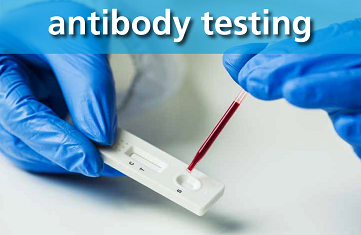Dr Janice Bailie, Assistant Director, R&D Division, PHA

As of 2 July 2020, the SARS-CoV2 pandemic has topped 10 million cases worldwide and claimed over half a million lives. The immune systems of the global community were naïve to this new pathogen, which has proven to be highly infectious and extremely lethal. During the pandemic, the pace of research has been unprecedented and our knowledge of the virus and its effects is growing day by day.
Exposure to viruses often results in the production of antibodies specific to that particular viral particle. Antibodies are a signal that the immune system has been activated, and some are able to neutralise the virus by binding to proteins or other molecules on the surface of the viral particle, interrupting the cycle of infection. This often means that subsequent exposure to the same virus can invoke immunological memory, resulting in rapid production of the same neutralising antibodies to attack the virus, and recovery from the infection. So far, research has identified antibodies with specificity to surface proteins of the SARS-CoV2 virus in people who tested positive for the virus, but despite the speed of progress, it has yet to be proven whether these antibodies are capable of conferring immunity to someone subsequently re-exposed to the virus, and if so, for how long that immunity would last.
Nonetheless, the presence of antibodies in the bloodstream can be used as an indicator of what percentage of the population has been exposed to SARS-CoV2. Those not showing antibodies in their bloodstream may be vulnerable to a second wave of the virus. Diagnostic tests, which can identify and accurately measure the presence and level of antibodies in blood samples, are becoming available and some have been approved by regulatory agencies, although as yet none has been formally adopted into clinical practice, because there is as yet no clear clinical outcome that can be linked to a positive antibody test.
Antibody seroprevalence (the proportion of the population with antibodies in their bloodstream) studies are underway around the world, as countries race to establish the proportion of their population with antibodies to the SARS-CoV2 virus by mass testing of blood samples. A number of studies across the UK have shown growing levels of antibody seroprevalence in the larger cities like London, but more rural areas with lower population densities are showing lower levels of antibody seroprevalence.
In Northern Ireland, initial studies are examining antibody seroprevalence in different population groups. A random selection of residual biochemical specimens has been analysed to give an early estimate of antibody seroprevalence in the population being tested in hospital laboratories around the province. This very simple study has suggested that a low percentage, less than 5%, of the Northern Ireland population has antibodies to SARS-CoV2. The HSC has also taken responsibility to roll out antibody testing for staff, and this is currently underway across all of the Trusts. Although the percentage seroprevalence in healthcare workers varies depending on whether they work in a patient-facing role, or an office or laboratory environment, the observed average in the Northern Ireland healthcare worker population is still similarly low.
Although children are relatively less impacted by the virus, they may still play a role in the spread of infection, so it is critically important to ensure that we know the antibody seroprevalence in young children, especially as we plan to re-open schools. Northern Ireland is taking a lead in this area of research, with the RAPID-19 study testing for antibodies in the children of healthcare workers led by Chief Investigator Dr Tom Waterfield from the Royal Belfast Hospital for Sick Children and Queen’s University Belfast. Although results are not yet published from this study, extremely low levels of seroprevalence are being seen in young children in Northern Ireland.
In late July a large UK-wide study, the COVID-19 Infection Survey (CIS), is due to roll out in Northern Ireland. This study, already underway in England and Wales, aims to invite a sample of people living in around 13,000 households in Northern Ireland to complete a questionnaire, take a swab test for viral infection and, in 10-20% of households, one individual will also be asked to provide a blood sample for antibody testing. This study will follow up participants over 12 months to determine whether they become infected or develop antibodies during that time, and if so for how long the antibodies remain. Given the importance of understanding the spread of SARS-CoV2 virus within our population, we in the Public Health Agency would strongly encourage those who receive the invitation to take part in the survey to accept.
These important studies will help us plan as we begin to release lockdown measures during the summer months and early autumn, and as vaccine trials begin during the coming months, will also show us where vaccination would bring the most benefit to the population in Northern Ireland and UK-wide.
For more information on the Health and Social Care Research and Development Division, visit: www.research.hscni.net
